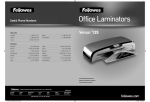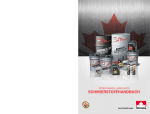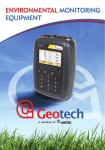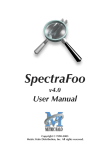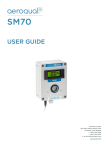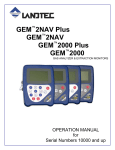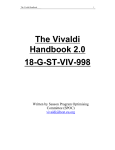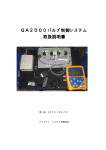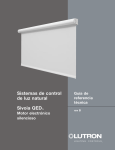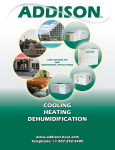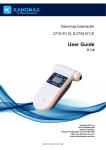Download GAS & AIR SAMPLING & MONITORING
Transcript
GAS & AIR SAMP. & MON. GAS & AIR SAMPLING & MONITORING What does a PID measure? PID - Photo Ionization Detectors LEL Explained LEL Monitors Infrared Methane Sensors Explained Landfill Gas Monitors Calibration Gas Weather Monitors Dust Monitor Dust Sampler 1 PID GAS & AIR SAMP. & MON. MiniRAE 3000 Portable PID 0-15,000ppm range The intrinsically safe hand-held PID from RAE Systems features a powerful built-in piston pump with sample flow rates of 500cc/min. The field rugged PID has excellent response and remote monitoring capabilities for confined space entry and leak detection. It is also used in the field of leaking underground storage tanks and for head space analysis in soil, wells and water. A special sensor design and reliable lamp produces stable base line and span for increased sensitivity and accuracy. Features • The patented sensor provides the following unique features: 3-second response time; extended range up to 15,000ppm with improved linearity, humidity compensation with integral, humidity and temperature sensors • Designed for simple service with easy access to lamp and sensor in seconds without tools • Big graphic display for easy overview of gas type, correction factor and concentration • Field-interchangeable battery pack replaced in seconds without tools • Integrated flashlight for better view in dark conditions • User-friendly screens, including dataplot chart view • Integrated RAE Systems correction factors list for more than 200 compounds to measure more chemicals than any other PID • Multi-language support with 12 languages encoded • Rugged housing withstands use in harsh environments • Cleaning and decontamination in water • Strong protective removable rubber boot 2 Specifications Display Graphic 4 lines, 28 x 43 mm, with LED backlight for enhanced display readability Keypad 1 operation and 2 programming keys, 1 flashlight on/off Direct Readout Instantaneous reading VOCs as ppm by vol. High values STEL and TWA Battery and shutdown voltage. Date, time, temperature Range 0 to 999.9 ppm (0.1ppm res) 1000-15,000ppm (1ppm res) Alarms 95 dB (at 30 cm) buzzer and flashing red LED to indicate exceeded preset limits • High: 3 beeps and flashes per second • Low: 2 beeps and flashes per second • STEL and TWA: 1 beep and flash per second • Alarms latching with manual override or automatic reset • Additional diagnostic alarm and display message for low battery and pump stall IP Rating IP67 unit off and without flexible probe IP65 unit running Datalogging Standard 6 months at one-minute intervals Calibration Two-point or three-point calibration for zero and span. Calibration memory for 8 calibration gases, alarm limits, span values and calibration dates. Sampling Pump Internal, integrated flow rate at 500 cc/mn Sample from 100’ (30m) horizontally and vertically Low Flow Alarm Auto pump shutoff at low-flow condition CommunicationDownload data and upload instrument setup from PC through charging cradle or optional Bluetooth™ Wireless data transmission through built-in RF modem Hazard Area Approval US and Canada: UL, cUL, Classified as Intrinsically Safe for use in Class I, Division I Groups A, B, C, D Europe: ATEX II 1G EEx ia IIC T4 (pending) IECEx: II 1G EEx ia IIC T4 (pending) Temperature -20° to 50° C Humidity 0% to 95% relative humidity (non-condensing) Attachments Durable bright yellow rubber boot with belt clip Size 25.5 x 7.6 x 6.4 cm Weight 738gm Sensors Photoionisation sensor with standard 10.6 eV or optional 9.8 eV or 11.7 eV lamps Battery Rechargeable, external field-replaceable Lithium-Ion battery pack Ordering Information ACE059-B116-000 MiniRAE 3000 PID with 10.6 eV lamp. Also includes: Li-ion battery, Datalogging with ProRAE Studio Software Package, Charging/download adapter, Flex-IProbe™, External filter, Rubber boot, Alkaline battery adapter, Lamp-cleaning kit, Tool kit, Operation & Maintenance manual, Soft leather case. PID with accessories kit adds: Hard transport case with pre-cut foam padding, Charging/download cradle, 5 Porous metal filters and O-rings Organic vapor zeroing kit, Gas outlet port adapter and tubing Intrinsically Safe Available to Rent PID - Photoionisation Detector Specifications Portable PID Size 25.5 x 7.6 x 6.4 cm Weight 738 g Sensors Photoionisation sensor with standard 10.6eV lamp Battery • Alkaline battery adapter • External field- replaceable lithium-ion battery pack, if specified Operating Hours12 hours with lithium-ion battery Display Graphic 4 lines, 28 x 43 mm, with LED back light Keypad 1 operation and 2 programming keys, 1 flashlight on/off Direct Readout Instantaneous reading of: • VOCs as ppm by volume • High and low values • Date and time Alarms 95 dB buzzer (at 30 cm) and flashing red LED to indicate exceeded preset limits • High: 3 beeps and flashes per second • Low: 2 beeps and flashes per second • Alarm latching with manual override or automatic reset • Additional diagnostic alarm and display message for low battery and pump stall IP Rating IP-65 Calibration Two-point calibration for zero and span Sampling Pump • Internal, integrated flow rate at 400 cc/min • Sample from 100’ (30m) horizontally and vertically Low Flow Alarm Auto shut-off pump at low-flow condition Hazard Area Approval IECEx Ex ia IIC/IIB Gb T4 -20°C≤Ta≤+50°C Operating Temperature -20° to 50° C Humidity 0 to 95% relative humidity (non-condensing) Attachments Durable green rubber boot 0-5,000ppm range The MiniRAE Lite’s photoionisation detection (PID) range is 0 to 5,000 ppm. This makes it an ideal instrument for applications ranging from environmental to construction. Note: this instrument is not rated intrinsically safe. Key Features • Proven PID technology—The patented sensor provides the following unique features: - 3-second response time - Range up to 5,000 ppm - Humidity compensation • Designed for service—Easy access to lamp and sensor in seconds without tools • Big graphic display for easy overview of concentration • Field-interchangeable battery pack, replacable in seconds without tools • Integrated flashlight for better visibility in low light • Rugged housing withstands use in harsh environments PID Holster & Belt • Frees up both hands for increased safety when climbing • Military style leg position keeps the instrument at your fingertips • Easy decontamination • 45kg rated Velcro - backed holster keeps the instrument secure • Charge and calibrate instrument without removing it from holster • Holster is comfortable and allows the wearer to move freely GAS & AIR SAMP. & MON. MiniRAE Lite Ordering Information ACE011-3040-000 Leg Harness / Holster without belt ACE011-3041-000 Utility belt for holster Ordering Information ACE059-A110-000 MiniRAE Lite Monitor, Li-Ion battery, 10.6 eV UV lamp, External filter, Green rubber boot, Alkaline battery adapter, Lamp cleaning kit, Tool kit, charger, manual, Soft leather carrying case MiniRAE Lite with accessories kit adds: Hard transport case with pre-cut foam, 5 Porous metal filters and O-rings, Organic vapor zeroing kit and Gas outlet port adapter and tubing 3 PID - Photoionisation Detector, Gas Monitor GAS & AIR SAMP. & MON. EntryRAE Specifications PID & 4 Gas Size 15cm x 8.3cm x 4.8cm without clip Weight 567g with battery and clip Sensors 5 Sensors: - Protected catalytic bead for combustible gases (LEL) - Electrochemical sensors for oxygen (O2) and hydrogen sulfide (H2S) and carbon monoxide (CO) - Modular photo ionisation detector for broadband detection of VOCs using 10.6eV lamp Battery - Drop-in rechargeable with Li-ion battery pack - Standard alkaline battery adaptor - Charging cradle doubles as external battery charger Operating HoursUp to 16 continuous with Li-ion Up to 12 hours with alkaline Display Large 3.5cm x 4.5cm display with automatic back-lighting in dim light or alarm condition Keypad 3 button operation Direct Readout - Oxygen as percentage by volume - Combustible gas as percentage of lower explosive limit (LEL), percentage by volume - VOCs, CO & H2S as parts per million - TWA & STEL values for VOCs, CO & H2S - High and low values for all gases Confined Space Entry Monitor Affordable OSHA compliance plus reliable VOC protection. The EntryRAE is a 4-gas monitor, plus photo ionisation (PID) detector. Reliable, easy to operate and simple to calibrate, the EntryRAE delivers added protection without added complexity. Why PID? Typical 4-gas monitors don’t detect volatile organic compounds (VOCs). VOCs are combustible and often toxic at the levels far below 10% LEL. They are commonly found in: • Fuels, oils, degreasers • Industrial cleaners • Heat transfer fluids • Solvents, paints • Plastics, resins, adhesives • Pesticides and herbicides These are common industrial compounds you find in or bring into a confined space. Features • Reliable, accurate VOC detector • Simple to operate • Easy to calibrate • Durable, weather-resistant rubber body • Data logging included • Large display with auto-backlight • Loud alarm • Bright red flashing LED alarms • Up to 16 hours of continuous operation • Interchangeable Lithium-ion and alkaline battery packs • Charging cradle doubles as an external battery charger • Powerful pump allows sample draws up to 30m 4 RAE046-XXXX-XXX EntryRAE, VOC and max. 4 other sensors, Lithium-ion rechargeable battery, alkaline battery adpator, 5 external filters, charging cradle, ProRAE Studio software package, computer interface cables, RS232 with USB adaptor, calibration adapter, user manual, shipping case ACE046-P111-101 EntryRAE for VOC (10.6eV PID), LEL, O2, H2S & CO unit with accessories kit Sensor Specifications PID Ordering Information Range Resolution 0-999ppm VOC 1ppm VOC Oxygen (O2) 0-30% 0.1% Combustible Gases (LEL) 0-100% LEL 0-5% Volume 1% LEL 1% Vol Carbon Dioxide (CO2) 0-500ppm 1ppm Hydrogen Sulphide (H2S) 1-100ppm 1ppm Intrinsically Safe LEL Explained LEL sensors are used for the detection of a wide variety of combustible gases and vapors that exhibit different responses. Combustible gases (or flammable gases) can burn or explode, potentially causing extensive damage to plant and/or personnel. Applications •Confined space entry •Wastewater treatment plants •Marine and off-shore oil wells •Landfill operations •Trenches, silos, railcars •Coal mines •Cruise ships •Sewers and manholes •Tunnels •Refineries and petrochemical For a combustible gas to ignite, three conditions are needed: • gas in sufficient quantity • air or oxygen in sufficient quantity • ignition source plants including off-shore drilling and plant shut downs •Power plants •Pulp and paper industry •Steel mills Combustible gas must be present in a high enough concentration to ignite. The minimum concentration needed is called the Lower Explosive Limit or LEL. What’s the difference between PID and LEL Sensors? In summary they have different detection techniques: How does it work? An LEL sensor consists of matched detector and compensator made from coils of platinum wire embedded within a catalytic bead. able to detect heavy or long chain hydrocarbons eg. diesel fuels/jet fuels. 2. PIDs use high energy uV light from a lamp to remove an electron from neutrally charged VOC molecule, producing a flow of electrical current proportional to the concentration of the contaminant. 3. The larger the molecule, the lower the energy required – thus the larger the molecule, the easier to detect. 4. Small hydrocarbons such as methane are not detectable with a PID. The energy required to detect methane with a PID exceeds to energy of the uV light produced by the PID lamp Oxidation of combustibles gases and vapours releases heat, changing the resistance of one element with respect to the other – which is detected as an out of balance voltage in the bridge circuit. LEL sensors have a diffusion barrier to limit the gas flux to the catalytic bead, they tend to have the greatest sensitivity to high diffusivity compounds such as Hydrogen and Methane than Kerosene. Correction factors have been determined that enable the user to quantify a large number of chemicals using only 1 single calibration (eg Methane). 1. LEL Sensors are not readily Diffusion vs Pump Gas monitoring meters like the QRAE, that monitor (Combustibles) LEL, Oxygen, H2S, CO and exotic gases can come as: •Unit with a pump •Unit with no pump (called diffusion heads or diffusion pumps) GAS & AIR SAMP. & MON. LEL explained The latter relies on the ambient atmosphere to diffuse to the sensor heads before a reading can be taken. Catalytic Bead sensors create a small vacuum which is enough to pull the sample through. The main disadvantage of pump type meters is the sample is drawn through a gas chamber and takes a few seconds to actually hit the sensors. Diffusion pumps have their sensors placed very close to the atmosphere which gives a faster response time. Diffusion LEL monitors suit most applications but a pump driven LEL is best for: •Detection of gases in hard to reach areas, where tubing is needed for easy reach •Detection of supertoxics (exotic gases) where the specific gravity is different to oxygen Can I use an LEL for a Landfill application? No, it is not recommended for the following reasons: •Although catalytic technology will work up to a certain point it requires calibration on a very regular basis unlike Infra-Red Sensors that come with Landfill Gas Monitors (GA2000’s etc). •Catalytic Technology requires the presence of oxygen – landfill wells monitoring lacks oxygen and therefore LELs will not perform properly in this situation. •There are a number of chemicals and gases that poison the catalytic sensor and basically kill it in a very short amount of time. These chemicals and gases include silicone which is by far the worst. As silicone is used in a number of compounds (namely as a sealant e.g. silicone rubber) it would be very difficult to ensure that the catalytic technology will not be isolated from any of this. 5 LEL Monitors GAS & AIR SAMP. & MON. QRAE II Specifications Pump or Diffusion Size Diffusion 12.5cm x 7.2cm x 3.8cm Pump 12.5cm x 7.2cm x 5.0cm Weight Diffusion 250 g Pump 350 g Sensors • Catalytic bead for combustibles • Oxygen: SPE O2™ (non-consumable Solid Polymer Electrolyte technology) • Toxic: electrochemical, H2S, CO or SO2 Battery Interchangeable Lithium- ion and alkaline battery packs Operating Period Diffusion Up to 14 hours continuous operation with Lithium-ion battery, up to 10 hours with alkaline battery (typical, without alarm) Pump Up to 10 hours with Lithium-ion battery, up to 8 hours with alkaline battery Display Graphic 4 lines, with LED automatic back light in dim light or alarm condition Keypad Two-key operation Alarms 95dB buzzer (at 30 cm) and flashing red LED IP Rating IP-65 Datalogging Standard 12 days at one- minute intervals Calibration Two-point calibration for zero and span Sampling Pump Optional, internal pump 300 cc/mn Hazardous Area Approval • US and Canada: CI, D1, Groups A, B, C, D, T4 • Europe: ATEX II 2G EEx ia d IIc T4 • IECEX: Ex ia d II C T4 Temperature -20° to 50° C Humidity 0% to 95% relative humidity (non-condensing) The QRAE II is available as a diffusion or pumped one-tofour gas monitor for detection of combustibles, oxygen, hydrogen sulfide, carbon monoxide or sulfur dioxide. Key features include an easy-tochange battery pack, a waterresistant case and a new state-ofthe-art O2 sensor. Key Features • Patented SPE O2™ Oxygen sensor with the following unique features: Lead-free design that complies with RoHS directive and extended life compared to leadtype electrochemical oxygen sensors, resulting in a low cost of ownership. • Leak-free design, minimizing downtime. • Best EMI/RFI immunity technology for products in its class, eliminating radio interference. • Easy access to pump, sensors, filter and battery compartment without exposing electronic components to potential damage. • IP-65 water- and dust-resistant case. • Strong, protective, concussionproof design. Additional Advantages • Plug-in sensors: oxygen, combustibles, hydrogen sulfide, carbon monoxide or sulfur dioxide. • Intuitive simple-to-operate twobutton user interface with built-in pump. • Pump or diffusion models available. • Cradle doubles as an external battery charger and data transfer connection. • Rugged housing • Large graphic display for easy overview of gas type and concentration. • Rechargeable Lithium-ion battery pack provides up to 14 hours of continuous operation. 6 Sensor Specifications Range Resolution Oxygen (O2) 0-30% 0.1% Combustible Gases (LEL) 0-100% LEL 1% LEL Carbon Monoxide (CO) 0-1000ppm 1ppm Hydrogen Sulphide (H2S) 0-100ppm 0-1000ppm 0.1ppm 1ppm Sulphur Dioxide 0.1-100ppm 0.1ppm VRAE Hand Held 5 Gas Surveyor The VRAE is a hand held 1,2,3,4 or 5 gas monitor with built-in sampling pump and optional datalogging. Sensors include new RAE dual range 0-100% Volume and 0-100% LEL, oxygen and three smart interchangeable toxic sensors, or up to four smart, interchangeable toxic sensors. The internal pump automatically shuts off plus an alarm is activated, if the remote probe tubing crimps or water is sucked onto the field replaceable hydrophobic filter. User selectable, calibrated sensor analog output is available in addition to datalogging. Features • Large, alarm activated back light LCD display • Visual alarm with flashing light • Large keys usable with gloved hand • Rigid inlet probe • 10 hours operation • Sample collection port • 16,000 data points download to PC • Rubber boot for protection Sensors Options Include • Carbon monoxide • Hydrogen Sulphide • Combustibles/LEL • Oxygen • Sulphur Dioxide • Nitric Oxide • Nitrogen Dioxide • Chlorine • Ammonia • Hydrogen Cyanide • Phosphine • Ethylene Oxide Applications • Refineries and petro chemical plants - confined space entry, hot work permits • Utilities - cable vaults, transformer stations • Waste water treatment plants - confined space entry • Marine and off shore oil wells - testing of confined spaces • Landfill operations - monitoring wells and confined spaces Specifications Intrinsic Safety UL & cUL Class 1, Division 1, Group A, B, C, D (US & Canada) EEx ia IIC T2 (Europe) Pending Size 197 x 70 x 38mm Weight 568gm w/ battery pack Detector Catalytic sensor for combustible gas. Electrochemical sensors for oxygen and toxic gasses Battery Rechargeable, snap-in, field replaceable 4.8V, 1.1Ah NMH battery pack. 4 AA alkaline battery adapter Operating Hours10 hours continuous Battery Charging 10 hrs charge through built-in charger or an ext. battery charger Display 2 line by 16 digit LCD with LED back light automatically in dim light or alarm condition Keypads 1 operation and 2 program keys Direct Readout Instantaneous (up to 5 values). Oxygen as percentage by volume. Combustible gas as percentage by volume or percentage of lower explosion limit. Toxic gases as parts per million. High and low values for all gases. STEL, TWA for toxic gases. Battery and shut down voltage. Alarm 90 dB buzzer & flashing LED to indicate exceeded preset alarms Calibration Two points field calibration of zero and span gas Datalogging 16,000 points down load to PC with serial number of unit, user ID, site ID and calibration date Datalogging interval 1 - 3,600 seconds programmable Sampling Pump Internal pump, flow rate 400cc/min. Auto shut-off at low flow condition Temperature -20oC to 40oC Humidity 0% to 95% relative humidity (non-condensing) GAS & AIR SAMP. & MON. LEL Monitors Ordering Information ACE018-XXXX-XXX VRAE unit with combustible oxygen and up to 3 toxic sensors OR combustible, and up to 4 toxic sensors, Rechargeable NMH battery pack, Filter and O-ring pack, 5” Inlet probe, Gas outlet port adapter, Manual, Rubber boot with belt clip, Alkaline battery adapter. Rechargeable units additionally include -Nickel-Metal-Hydride (NiMH) battery -120 or 230 V AC/DC wall adapter (if specified) VRAE with accessories kit adds Hard transport case with pre-cut foam padding, 15’ (5m) Tygon® tubing, Tool kit Intrinsically Safe 7 Infrared Methane Sensors Explained GAS & AIR SAMP. & MON. Infrared Methane Sensors in Landfill Gas Monitors What is Landfill Gas? The waste within a landfill will consist of a wide variety of substances, but a large proportion will be biodegradable. This will include animal and vegetable matter, paper and wood. These substances can be decomposed by micro-organisms within the landfill and this breakdown process produces gas. Landfill gas can be a complex mixture of gases, but a few gases predominate. Initially, carbon dioxide is the main gas, but there can also be significant quantities of hydrogen. Methane is produced during the major part of the decomposition process. Many other gases can be produced in trace amounts and the exact composition of the gas will vary between different landfill sites, different parts of the same site and over time. Infrared absorption Infrared absorption is usually the preferred method for measuring methane and carbon dioxide. Most gases absorb radiation in the infrared region. The wavelength of radiation that is absorbed is determined by the natural vibration frequencies of the molecule. These natural frequencies will depend on the bond strengths, molecule size and shape and mass of the atoms involve. Thus different gas molecules have different natural frequencies and will absorb infrared radiation of different wavelengths. Figure 3 shows the absorption bands of methane and carbon dioxide. See Geotechnial Instruments range of landfill gas and biogas instruments on pages 161-163 8 »» This property is used in infrared absorption to select a specific gas for analysis. By using infrared radiation of the same wavelength as the absorption band, the technique can be made specific to a particular gas - a useful property when analysing one gas within a mixture. Infrared radiation from a source is passed through the gas to be analysed. Several infrared detectors are positioned to measure the amount of infrared radiation that has passed through the gas. A filter that is tuned to the wavelength of interest is positioned in front of the infrared detector. This then makes that particular detector sensitive to the gas of interest. By using several detectors with different filters a number of different gases can be detected at the same time. The amount of radiation absorbed will be proportional to the path length through the gas and the concentration of the gas. Since the path length is fixed, the concentration of the gas can be calculated. Can I use an LEL for a Landfill application? No, it is not recommended for the following reasons: •Although catalytic technology will work up to a certain point it requires calibration on a very regular basis unlike Infra-Red Sensors that come with Landfill Gas Monitors (GA2000’s etc). •Catalytic Technology requires the presence of oxygen – landfills, well monitoring lacks Oxygen and therefore LELs will not work properly in this situation. •There are a number of chemicals and gases that poison the catalytic sensor and basically kill it in a very short amount of time. These chemicals and gases include silicone which is by far the worst. As silicone is used in a number of compounds (namely as a sealant e.g. silicone rubber) it would be very difficult to ensure that the catalytic technology will not be isolated from any of this. Infrared absorption can be made robust, accurate and stable. It also requires little or no routine maintenance and an infrared absorption cell has a lifetime of many years.1 1 Excerpts from “Monitoring Landfill Gas”, Article in Asian Environmental Technology Nov ‘07 - Geotechnical Instruments Landfill Gas Monitors GA2000 Landfill Gas Analyser CH4 0-70% by specification, 0-100% reading CO2 0-60% by specification, 0-100% reading O2 0-25% H2S 0-500ppm *H2 Compensated CO 0-500ppm* for GA2000 Plus Gas Accuracy The industry standard GA2000 is designed to meet landfill monitoring protocols set by Government legislation. Utilised with dedicated software the GA2000 becomes an extremely powerful detection monitoring and change indicator tool. GA2000 & GA2000Plus GPS Option The on-board GPS option locates boreholes simply, fast and accurately. Its easy-to-read ‘whereto-go’ on-screen directions save time especially for technicians on different sites. •Real time GPS tracking and location •GPS location of borehole stored with readings •On-site store locations •Google Earth mapping CO2 O2 0-5% +0.5% +0.5% +1.0% 5-15% +1.0% +1.0% +1.0% +3.0% +3.0% +1.0% 15% Full Scale This equipment has been certified for use in potentially explosive atmospheres in accordance with ATEX directive 94/9/EC. Equipment group and category: EX II 2 G. Protection concept: Eex ibd IIA T1 (Ta = 0 °C to +40 °C). Features & Benefits • ATEX certified • 5 Gases standard • Peak CH4 recording • Simultaneous display of all gases • Storage of site and ID questions • Field proven • Standardises monitoring routines • Easy transfer of data • Optional Internal flow • Optional Event log with technician log • Data storage 2000 readings and • Optional GPS Main Applications • Landfill sites • Biogas • Site investigation CH4 GAS & AIR SAMP. & MON. GA2000 & GA2000 Plus Specs Relative Pressure +500mbar (direct measurement Operating Temperature Range 0°c - 40°c Relative Humidity 0-95% non-condensing Barometric Pressure Range + 200 mbar from calibration pressure Barometric Pressure Activity ± 5 mbar absolute Battery Life Typical use 10 hours from fully charged Charge Time Approximately 2 hours from complete discharge GA2000 & GA2000Plus GA2000 Plus H2 Compensated CO Landfill Gas Analyser The GA2000 Plus utilises new technology to give more reliable readings for Carbon Monoxide (CO), helping determine the presence of fires on landfill. It incorporates the existing technology and features of the industry standard GA2000. Ordering Information GTIGA2000 GA2000 ATEX Certified Infrared Gas Analyser - 5 Gas Measures CH4/CO2/O2/H2S/CO. GTIGA2K2-E000 GA2000 ATEX Certified Infra-red Gas Analyser (no cells) - 3 Gas Measures CH4/CO2/O2. GTIGA2K4 GA2000Plus ATEX Certified Infra-red Gas Analyser - CO Version Measures CH4/CO2/O2/H2S and CO with a Hydrogen compensated CO Cell (Hydrogen level also indicated) GTIGA2K5 GA2000Plus ATEX Certified Infra-red Gas Analyser NH3 Version Measures CH4/CO2/O2/H2S/NH3 GTIGA2K3 GA2000Plus ATEX Certified Infra-red Gas Analyser H2 Version Measures CH4/CO2/O2/H2S/H2 GTIINTFLOWMAN Internal flow option GTIEVENTMAN Event log option GTIGPSKIT GPS option GTIGAM Gas Analyser Manager Software GTIUSBLEAD USB Communications Lead Intrinsically Safe 9 Landfill Gas Monitors GAS & AIR SAMP. & MON. GEM2000 Plus Landfill Gas Analyser Specifications CH4 0-100% Reading CO2 0-100% Reading O2 0-25% CO 0-2000ppm (H2 Compensated) H2S 0-500ppm Gas Accuracy The GEM2000 Plus is designed to monitor landfill gas extraction systems. Utilising new technology the GEM2000 Plus gives increased reliability for Carbon Monoxide (CO) readings. It retains the features of the field proven GEM2000. This equipment has been certified for use in potentially explosive atmospheres in accordance with ATEX directive 94/9/EC. Equipment group and category: EX II 2 G. Protection concept: Eex ibd IIA T1 (Ta = 0 °C to +40 °C). Features & Benefits • ATEX certified • Measures H2S and CO • Measures % CH4 CO2 and O2 static pressure and differential pressure • Calculates balance gas flow (m3/h) and calorific value (KW or BTU) • Records %LEL of CH4 Peak CH4 and user defined comments • Accepts protocols • Allows balancing of gas extraction • Modem for remote download • Optional Event log • Data storage 2000 readings and 1000 IDs • 0-500ppm H2S readings • Technician log Main Applications • Gas extraction fields • Flare monitoring • Landfill sites CH4 CO2 O2 0-5% +0.5% +0.5% +1.0% 5-15% +1.0% +1.0% +1.0% +3.0% +3.0% +1.0% 15% Full Scale GEM2000 Plus shown with optional Pitot Tube Static Pressure +500mbar (direct measurement) Differential Pressure +125 mbar (direct measurement) Operating Temperature Range 0°c - 40°c Relative Humidity 0-95% non-condensing Barometric Pressure Range +200 mbar from calibration pressure Barometric Pressure Activity ± 5 mbar Battery Life Typical use 10 hours from fully charged Charge Time Approximately 2 hours from complete discharge Ordering Information GTIGEM2000 GEM2000 ATEX Certified Infra-red Gas Analyser (no cells) Measures CH4/CO2/O2 GTIGEM2000PLUS GEM2000Plus ATEX Certified Infra-red Gas Analayser Measures CH4/CO2/O2/H2S and CO with a Hydrogen compensated CO Cell (Hydrogen level also indicated) Intrinsically Safe 10 Landfill Gas Monitors Designed to meet biogas project requirements, this simple to operate analyser is the ideal field instrument for anaerobic digester gas analysis. Easy to use and portable, the biogas check measures gas compositon with repeatable accuracy on farms, food processing plants and wastewater treatment facitilies. Benefits • Enables consistent collection of data for improved analysis and accurate reporting • Validates flow and gas composition for carbon credit trading • Field proven technology Features • Measures % CH4, CO2, and O2 volume, static, differential and barometric pressures • Measures additional gases with optional gas pods • Reads gas temperature with optional temperature probe • Calculates balance gas and flow (SCFM) • ATEX certified • Easy field calibration by user • Self-test and monitoring on start up • Stores readings • Easy-to-read • User interchangeable lters Applications • Farm Digester • Food Processing • Wastewater • Methane Recovery Specifications CH4 0-100% Reading CO2 0-100% Reading O2 0-25% H2S H2S (optional external) 0 – 5000ppm H2S (optional internal) 0 – 10,000ppm Gas Accuracy CH CO2 O2 0-5% +0.5% +0.5% +1.0% 5-15% +1.0% +1.0% +1.0% +3.0% +3.0% +1.0% 4 15% Full Scale GAS & AIR SAMP. & MON. Biogas Check Biogas Analyser Static Pressure +500mbar (direct measurement Differential Pressure +125 mbar (direct measurement, less barometric) Operating Temperature Range 0°c - 40°c Relative Humidity 0-95% non-condensing Barometric Pressure Range ± 200 mbr from calibration pressure. Recommendeed field calibration mix 60% CH4 40/% CO2 Barometric Pressure Activity ± 5 mbar absolute Battery Life Typical use 10 hours from fully charged Charge Time Approximately 2 hours from complete discharge Ordering Information GTI BM2K-E000 Biogas Check Analyser Measures CH4/CO2/O2 GTIBM2K-E000H2S Biogas check Analyser with H2S gas pod Intrinsically Safe 11 Landfill Gas Wellheads Flow Accuracy and Reliability The Accu-Flo system is designed to operate in the wet, abrasive environment typical of landfill gas and still provide exacting control and accurate flow measurements with high dependability and consistency. Accu-Flo Wellheads can help prevent landfill gas migration, landfill gas emissions and subsurface fires. Landfill owners and operators will appreciate the Accu-Flo proven design that meets the special requirements of landfill gas (LFG) recovery for environmental compliance and energy production. 12 To help protect the impact tube from condensate and particulate clogging, common with conventional designs such as pitot tubes and orifice plates, the Accu-Flo uses an enlarged total pressure port opening and a separate protected static pressure port. Also, pre-calibration of the measurement tube with a prepositioned impact tube eliminates the need to take time-consuming traverse measurements normally required for accuracy. Quick and Versatile Installation The prefabricated Accu-Flo assembly, factory tested and warranted, is shipped ready for immediate installation - eliminating the cost and uncertainties of field fabricated units. Accu-Flo models are available for installation above or below ground on vertical wells or horizontal branch laterals in flow ranging from 1 to over 300 SCFM. Pressure Drop Benefits • Compact size • Easy installation and maintenance • Built-in gas flow measurement • Built-in gas flow control gate valve • Quick connect measurement ports • High accuracy and repeatability of measurements • Durable Materials: Sch. 80 PVC housing and couplings, stainless steel impact tube, and polypropylene fittings, elastomeric coupling and PVC • Flexible interconnects The measurement tube assembly houses a modified stainless steel impact tube specifically designed for harsh landfill gas applications. Differential pressure readings between the impact tube and measurement tube are used to calculate flow. Flow Rate (SCFM) Accu-Flo helps maximise gas recovery, minimise surface emissions and subsurface migration, helps control hot spots and prevent subsurface fires. Simplified Data Collection Accu-Flo simplifies the complexity of measuring well head data by incorporating key built-in features including a LFG flow measuring device, gas temperature port, quick-connect gas sample ports and a flow control gate valve. The patented design expedited the time required to obtain key well head data and determine necessary flow adjustments using the industry standard instruments, GEM2000 or other field unit. 150 37mm (1.5in) 1-50 0.001 - 3.0 200 50mm (2.0in) 5-125 0.1 - 5.0 300 75mm (3.0in) 35300 0.1 - 10.00 Model Accu-Flo Wellheads provide operators with the gas extraction control necessary to meet more restrictive environmental and safety regulations, thus preventing unnecessary and costly violations. A patented feature of the Accu-Flo design is the pre-calibrated gas measurement tube assembly (AccuFlo body) which extends into a standard vertical or horizontal well casing or branch lateral, creating a compact installation. Size GAS & AIR SAMP. & MON. Accu-Flo Wellheads Calibration Gas GAS & AIR SAMP. & MON. Calibration Gas Calibration Gas made easy Now you can save time, money and headaches normally associated with obtaining and using calibration gas. EnviroEquip supplies the entire range of Air Liquide calibration gases available in handy disposable cylinders to suit your every need. Bump test your instruments before taking them out in the field A bump test checks the calibration of an instrument by exposing it to a known concentration of gas. The reading is compared to the actual quantity of gas shown on the Calgas cylinder. If the instrument’s response is within an acceptable tolerance range, the calibration is confirmed and the instrument is safe for use. 6D (103L) 8AL (58L) 6DM (58L) • • • Zero Air (99.999% N2) • ALE003132 • • • CO 100ppm, CH4 2.5%, O2 21% / N2 • ALE003022 • • H2S 25ppm / N2 • • ALE003322 • 25ppmH2S/ 100ppmCO/ 2.5%CH4/18%O2/N2 • • ALE003337 • CH4 50% v/v • • • • • • ALE003602 Isobutylene 100ppm/air ALE003671 ALE003105 CH4 2.5% (50% LEL) / air ALE003662 ALE003089 CH4 60%, CO2 40% v/v Fixed Flow 713 ALE004107 Demand Flow ALE003605 715 715 715 ALE004111 ALE004111 ALE004111 ALE004116 ALE004116 ALE004116 ALE004140 ALE004136 ALE004136 ALE004136 Many more gases & combinations are available - please contact us with your requirements Service Pressure PSIG Dimensions Length x Dia. Internal Water Vol L3 Tare weight Recomm. Regulators Outlet Fitting Cylinder Specifications Contents Full Service Pressure Cylinders for gas stability and long shelf life The Calgaz multiple-step treatment process for aluminium cylinders ensure the stability and consistency of reactive gases. In addition, Calgaz exclusive internal valve design gives added protection against contamination and damage. All Calgaz mixtures are prepared by the most accurate method available using gravimetric weights certified by N.I.S.T. Finally, every cylinder is leak-checked with the aid of mass spectrometry technology. Ongoing tests verify a remarkably long shelflife for Calgaz mixtures. 7HP (34L) Cylinder Type > 7EOC 17 litres 240 279x73mm 1L3 2kg 713 CGA 600 7HP 34 litres 500 279x73mm 1L3 3kg 713 CGA 600 6D 103 litres 1,000 351x82mm 1.52L 6DM 58 litres Cylinder Size Why use Calgaz - Disposable Calibration gases? When a worker steps into a confined space to do a job, everything depends on the accuracy of the safety monitoring equipment. This is why manufacturers, distributors and users of environmental safety monitoring equipment the world over rely on Calgaz calibration gas mixtures. • No rental deposit or demurrage charges. • Calgaz eliminates unnecessary costs by providing your calibration gases in lightweight, non-refillable cylinders. You don't have to spend the money normally associated with rental cylinders. Commonly requested gas-mixes 3 1,000 203x82mm 0.80L 3 4.8kg 715, 716, 1700 5/8” -18UNF 2.4kg 715, 716, 1700 5/8” -18UNF All cylinders composed of Steel except 8AL which is made of Aluminium 13 Regulators for Calibration Gas GAS & AIR SAMP. & MON. Demand Flow Regulators Regulators Portable Lab/Field Case The simplest way to calibrate The integrity of your sampling accuracy depends on the effectiveness of your gas regulating equipment. Each regulator is manufactured under rigorous Statistical Process Control and has a two year warranty. All regulators are permanently engraved with model number, flow rate and lot tracing number and are 100% tested to meet product specification. 700 Series Regulators These single stage piston type regulators are equipped with a control valve that allows constant gas flow for easy ON/OFF. Models 713, 715 and 718 have an option for preset flow. Each model is equipped with a cylinder pressure gauge. Demand Flow regulators (DFRs) are the simplest way to accurately calibrate your instrument. When turned on or opened, the regulators will only let the flowrate of gas through that the instrument is demanding. No more, no less. This means you can’t over force a higher flow rate through the instrument or starve it of calibration gas. Both situations could cause false calibration results. • No more gas bags to calibrate from • The fastest and simplest calibration method • Minimises calibration gas wastage • Easy to operate The Portable heavy duty impact resistant plastic Lab/Field Case can hold two 6D size non-refillable cylinders, regulator and tubing. It is a safe and convenient system for carrying and storing two 103 litre at 1000 psig calibration standards. Ordering Information ALE004208 Plastic calibration gas carry case (only). Fits 2 x 6D bottles. Gas and regulator sold separately Ordering Information Model Delivery pressure Max. Inlet Pressure Cylinder Pressure Gauge Specifications 713 140 kPa 3,500 kPa 0-3,400 kPa 715 400 kPa 6,900 kPa 0-6,900 kPa Seals Viton®A Seat Teflon®A Bonnet Nickel-plated Brass Gauges Chrome-plated Brass Inlet - Model 7131” x 20 Inlet - Model 7155/8” x 18 Outet 3/16” Hose Barb Delivery Weight 0.5kg 14 ALE004136 ALE004140 Demand flow regulator for 6D size (103L) bottle Demand flow regulator for 7EOC (17L) or 7HP (34L) bottle Gas Sample Bags Tedlar bags can be used for indoor air sampling, hazardous waste sites, leaking underground storage tanks, stack sampling, soil gas sampling, gas blending, calibration test standards and most other gas sampling needs. Using air bags is a reliable way to calibrate gas monitoring equipment. Most meters have an internal sample draw pump. The flow rate of these pumps can vary from small to many litres per minute. And as these pumps wear out, their flow rates tend to drop off. To avoid having to get a regulator or flow control device to exactly match the flow rate of the meter, it is simple to fill a gas bag with the calibration gas, then insert the inlet probe of the meter and let the meter sample at its own natural pump rate. This ensures a high degree of accuracy when calibrating. Tedlar gas sampling bags are made of 2mil PVF (Tedlar) film. Tedlar is tough durable and considered chemically inert to a wide range of compounds. How to use a Tedlar bag for sampling •Flush the bag at least three times with purified air or nitrogen before use. •Attach a piece of 6 mm OD Teflon or similar tubing from the hose/valve fitting of the bag to the outlet fitting of the pump or gas bottle. •Loosen the knurled screw on the bag, open the valve and tighten the knurled screw to lock the valve in place. •Activate the sampling pump or bottle and note the start time and any other pertinent information necessary. Avoid filling any bag more than 80 per cent of its maximum volume. •At the end of the sampling period, turn the pump off and close the valve on the bag. •Tighten the knurled screw to lock the valve closed. Note the ending time if necessary. Ordering Information CELTED1L 17.7cm x 17.7cm, 1 L CELTED3L 25cm x 37cm, 3 L EEQ23305 25cm x 57cm, 5 L Supplied with single Stainless Steel Fitting Sample Bag Chamber The EnviroEquip Sample Bag Chamber allows negative pressure provided by any air sampling pump or vacuum hand pump to draw a gas sample into a tedlar bag. GAS & AIR SAMP. & MON. Tedlar Sample Bags The sample is drawn into the bag without passing through the pump and there are no contamination issues. Ordering Information EEQSB1450 Sample Bag Chamber Hand Vacuum pump and sample bags sold separately All bags feature an eyelet and single 2-in-1 fittings that combine the valve and septum into one. 15 Weather Monitors GAS & AIR SAMP. & MON. Logging Rain Gauge RG20 Perfect for applications like Catchment Measurement, Rainfall Intensity, Hydrology and Irrigation Control. The RG20 is a compact, robust, automatic rain gauge. It consists of an inbuilt tipping bucket rain gauge sensor,windows software, data logger, rechargeable battery and solar panel. The rain gauge automatically sends its information to the data logger, which processes and stores the data in its memory. The data is then available for collection by personal computer either onsite or remotely via telemetry. Features • Stand-alone, self-recording unit • Level Bubble • Corrosion Resistant Materials • Robust Design • Simple Recalibration Procedure • Low Power Consumption Applications • Catchment Measurement • Flood Studies/Alerts • Rainfall Intensity • Meteorological Rainfall Monitoring • Agriculture and Horticulture • Hydrology • Irrigation Control The rain gauge sensor is factory calibrated so that each system is ready for use immediately. It can be used for an extended period without any need for adjustment. There are no electrical connections to be made, no mechanical assembly just mount the unit on a suitable base and switch it on. Thanks to its compact and innovative design, the Environdata Logging Rain Gauge is easy to carry to site, easy to set up, and easy to operate immediately. The unit’s memory provides up to 29,000 readings, facilitating highintensity data collection or long intervals between data collection. Data is stored in 3 independent secure areas with battery backup. Usually, daily summaries are stored in Memory Area 1, hourly data in Area 2, and rainfall intensity data in Area 3. If the system’s software should fail, perhaps as a result of a nearby lightning strike, an automatic circuit (“watch-dog”) will restart the logger within a minute, ensuring that data storage is uninterrupted.The internal, realtime clock ensures that the correct date and time are always stored with the data. 16 Specifications Operating Units Data Storage Resolution Power Supply Solar Panel Weight Dimensions up to 450mm/hour 29,000 readings 0.2mm 6V rechargeable battery ( internal). Capacity for 6 weeks without sunlight 1.0 watt panel - maintains battery with 3 hours bright sunshine per day. 2.5 kg 375mm (height) x 203mm (diameter) EVDRG20 Logging rain gauge with solar panel Ordering information Weather Monitors WeatherMaster 1600 The WeatherMaster 1600 package consists of four integrated electronic weather sensors, an internal data logger, solar panel, 2 metre powdercoated stand and EasiAccess database and reporting software. Common Features • Includes Windows based graphing, database and reporting software • Solar powered, durable stainless steel and powder coated aluminium construction • Provides current readings plus 15 minute, hourly and daily summary The WeatherMaster 1600 is an ideal, economical weatherstation for a variety of research, agricultural and industrial applications. It’s innovative integrated design is compact and light enough to be readily portable, however the unit is quite robust and can withstand remote siting in harsh locations. Measures: • Wind speed • Wind direction • Air temperature • Relative humidity • Optional 5th sensor, up to 100m away • Readily upgradable to the WM20 model • Stores 100 days of daily data, 65 days of hourly data and approx 4 weeks of 15 min data WeatherMaster 2000 The WeatherMaster 2000 is a compact automatic weather station designed to suit a variety of research, agricultural and industrial applications. The WeatherMaster 2000 package consists of six integrated electronic weather sensors, an internal data logger, solar panel, 2 metre powder-coated stand, automatic evaporation calculation and EasiAccess database and reporting software. Measures: • Wind Speed • Wind direction • Air Temperature • Relative humidity • Rainfall • Solar Radiation (& evaporation rate) • Optional 7th sensor, up to 100 m away • Stores 100 days of daily data, 65 days of hourly data and approx 20 days of 15 min data Sensor Specifications Air Temp -15ºC to + 50ºC, Accuracy +0.20C Relative humidity Electronic capacitance type. Accuracy + 5%, Range 10-90% Rainfall Tipping bucket mechanism, 0.2 mm resolution Wind Speed 3 Cup 66mm Anemometer, Resolution 0.1 kph, starting threshold 1kph Wind Direction Optical shaft encoder, resolution 6 deg, Accuracy + 6 deg Solar RadiationGlobal incoming with cosine correction, Accuracy + 5%, Cosine accuracy +3% Extra Sensors (optional) One only Barometric pressure, soil temp, or extra sensor same as the above excluding rainfall. GAS & AIR SAMP. & MON. Weather Stations Other specifications AD40 Software (Optional) Vector Analysis of Wind Speed Accurate recording of wind data while the wind is varying in speed or direction, or both, within the reporting period of the system can be difficult. In the case of monitoring airborne pollution it can be vital. As an example, using the standard (scalar) values available with most systems, half a minute of wind from the East and half a minute from the North would be reported as a wind direction of North-East. However, if the Easterly wind blows at a speed of 10 knots, the effect of Northerly gusts at 30 knots would be to blow airborne particles more North than East. The AirData software resolves the difficulty of accurate measurement by vector analysis or the net (combined) effect of wind speed and direction. The AirData software also records highest wind gust for each reporting period and provides the data necessary to calculate particle dispersion if required. Datalogger 104K battery backed RAM, stores a total of 29,000 data readings (plus time and data stamp) Battery 6 volt 3.0 AH internal sealed rechargeable gel cell - capacity for 6 weeks operation without sunlight Solar Charger 1.5 watt panel - maintains battery with 3 hours bright sunshine per day Weight 7 kg excluding mounting bracket CommunicationRS232 6 pin serial connection, 300 to 9600 Baud Ordering Information EVDWM16 EVDWM20 EVDAD40 Weather station with mounting bracket & software Weather station with mounting bracket & software AirData vector analysis software (optional) 17 Dust Sampler GAS & AIR SAMP. & MON. 18 High Volume Dust Sampler This design provides many significant advantages over previous units including: • Constant air flow - maintained well within 1% of the preset flow rate in normal operating conditions. • True mass-flow sensor - no need for temperature and pressure corrections. • Low energy consumption because motor load is determined by the filter. • Load and not by mechanical restrictions. • Low wear and long life because of low load - the vacuum pump has been proven in power stations at full load around the clock for many years. The absence of other mechanical or moving parts eliminates problems found in some products. • Low noise, quiet running - does not attract attention or annoy neighbours. • Soft start drives - ensuring the start current demand is kept at a very low level. • User-friendly filter collection and replacement - no more struggling with fragile tissue on-site in bad weather. The unique removable filter support and transport cover allows filter loading and recovery in a protected laboratory environment without risk of losing the sample. • Secure casing - preventing dust and rain ingress while permitting easy access for service. • The flow set incorporates well- proven PM10 and PM2.5 Heads allowing it to sample a variety of particle sizes. The heads have been wind tunnel tested to ensure accurate cut points. Specifications Hi-Vol with PM10 or PM2.5 head Hi-Vol with TSP head Hi-Vol Head Options PM10 collects particles smaller than 10microns PM2.5 collects particles smaller than 2.5micron TSP collects total suspended particles without separating different sizes Air Intake Uniform, 58,000mm2 nominal air intake Power Input 240V, 50Hz Nominal Current 4 A (at 70n.m.c Air Flow and Clean Filter) Start Current Switching Transient up to 5.0 A. Ramp up current 4 A Vacuum Pump / Motor Three Phase, 50Hz, 1.3 kW Motor Drive Variable Frequency, Soft Start Flow Control Mass Flow Sensor and PID Controller (Unaffected by variation in the ambient air temperature and pressure) Flow Control Precision Better than 1 SCMH Noise Profile (when running at 70 SCMH with clean filter and silencer) At 1 meter = 50dba At 2 meters = 44dba At 4 meters = 38dba At 6 meters = 35dba At 8 meters = 32dba Filter Support230 x 280mm (removable) (2 off, one with transport cover supplied as standard) Filter Size 20.3 x 25.4cm (8 x 10 inch) (Nominal) Cabinet Dimensions 400 x 340 x 1050mm High TSP Head Dimensions 450 x 450mm square PM10 Head Dimensions 710mm Diameter + 500mm Height Increase to overall height Overall Height 1140mm Nominal Weight 47 kg Temp Range -10°C to +40°C Flow Setting Range 20-100 SCMH Flow Indication Range 20-100SCMH




















